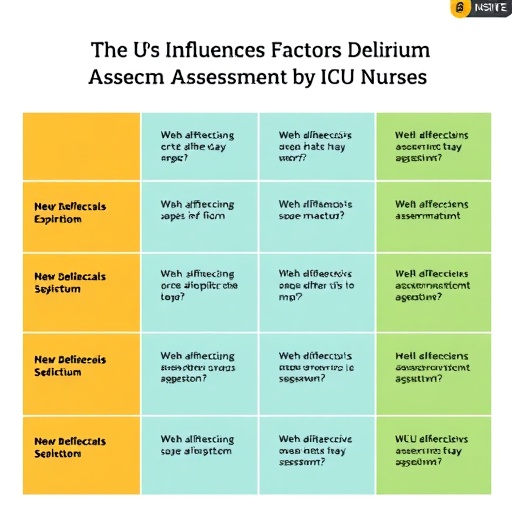In recent years, the field of nursing, particularly within intensive care units, has garnered significant attention for its role in patient outcomes. A recent study published in the esteemed journal BMC Nursing sheds light on a critical yet often overlooked aspect: the evaluation of delirium by intensive care nurses. This cross-sectional descriptive study, led by Öztürk, Kaya, and Aksoy et al., delves into the factors that influence how nurses assess delirium in critically ill patients. The findings not only highlight the challenges faced by nursing professionals but also point to the need for improved frameworks to enhance the assessment of delirium.
Delirium, characterized by an acute change in mental status, presents a compelling challenge within intensive care settings. Patients in these environments are often vulnerable, with complex medical histories and multiple medications that can affect their cognitive function. Understanding how nurses assess delirium is essential in ensuring that patients receive timely and appropriate interventions. The study’s authors aimed to unravel the intricate web of factors that may impact a nurse’s ability to effectively evaluate delirium, including educational background, clinical experience, and institutional protocols.
One of the key findings from the research suggests that educational preparedness plays a significant role in delirium assessment. Nurses who have undergone formal training specific to delirium management were found to be more confident and accurate in their evaluations. This underscores the importance of targeted education and training programs that address not just the clinical aspects of delirium, but also the nuances of assessing cognitive changes in critically ill patients. By equipping nurses with the necessary skills and knowledge, healthcare systems can optimize patient care and outcomes.
Additionally, the authors noted that clinical experience is a double-edged sword in the realm of delirium assessment. While seasoned nurses often bring a wealth of practical knowledge to the bedside, their familiarity with certain assessment tools can sometimes lead to complacency, causing them to overlook subtle signs of delirium. This observation raises questions about the balance between experience and ongoing education. Continuous professional development, including refresher courses on delirium assessment, could help mitigate such risks and ensure that experienced nurses remain vigilant in their evaluations.
Another significant factor identified in the study was the impact of institutional protocols on delirium assessment. In settings where standardized assessment tools and protocols were in place, nurses reported feeling more competent in their evaluation processes. On the other hand, in environments lacking clear guidelines, nurses expressed confusion and anxiety about assessing delirium, which could ultimately compromise patient safety. The authors argue that healthcare organizations must prioritize the development of standardized delirium assessment protocols to empower nurses and enhance patient care.
The study also touched on the psychological burden that intensive care nurses experience while assessing mentally distressed patients. Many nurses reported feelings of helplessness and frustration when faced with patients exhibiting signs of delirium. This emotional toll can not only affect a nurse’s assessment capabilities but also impact their overall job satisfaction and mental health. Implementing support systems within healthcare organizations, such as peer support groups and mental health resources, may help mitigate these feelings and provide nurses with the necessary coping mechanisms.
Moreover, the research indicated that interdisciplinary communication plays a crucial role in delirium evaluation. When nurses work alongside physicians and other healthcare professionals, the diagnostic process becomes more collaborative and effective. The study advocates for regular interdisciplinary rounds to discuss patient assessments, including delirium evaluations, to ensure that all team members share a unified understanding of patient needs and treatment plans. This holistic approach can lead to improved outcomes and enhanced team dynamics.
As the healthcare landscape continues to evolve, the need for innovative solutions to the challenges of delirium assessment is paramount. The authors of the study call for further research into technology-driven assessment tools that could assist nurses in real-time evaluations. Implementing digital platforms that utilize artificial intelligence to flag potential signs of delirium could serve as a valuable adjunct to traditional assessment methods. Such innovations have the potential to revolutionize patient care in intensive environments.
The findings from this study resonate not only within the nursing community but also raise broader questions about patient-centered care. Delirium is not merely a symptom to be treated; it is a poignant reflection of a patient’s overall health and well-being. By emphasizing the importance of comprehensive delirium assessments, the study advocates for a paradigm shift that prioritizes cognitive health alongside physical care in intensive care units.
In conclusion, Öztürk and colleagues’ investigation into delirium evaluation by intensive care nurses offers valuable insights into the myriad factors that influence this pivotal aspect of patient care. The authors’ recommendations for enhanced education, institutional protocols, and interdisciplinary collaboration pave the way for a more robust framework in delirium assessment. As healthcare continues to advance, it is crucial that nursing professionals are equipped with the tools and knowledge necessary to navigate the complexities of delirium and provide exceptional care to their patients.
The implications of this study extend far beyond immediate patient assessments, touching on deeper themes of nurse well-being, interdisciplinary cooperation, and the ongoing need for clinical innovation. As the healthcare community reflects on these findings, the ultimate goal remains clear: to ensure that every patient receives the compassionate, informed care they deserve, even in the most challenging of circumstances.
Subject of Research: Factors affecting delirium evaluation by intensive care nurses.
Article Title: Correction: Investigation of the factors affecting delirium evaluation by intensive care nurses: a cross-sectional descriptive study.
Article References: Öztürk, Z., Kaya, M., Aksoy, M. et al. Correction: Investigation of the factors affecting delirium evaluation by intensive care nurses: a cross-sectional descriptive study. BMC Nurs 24, 1233 (2025). https://doi.org/10.1186/s12912-025-03921-0
Image Credits: AI Generated
DOI: 10.1186/s12912-025-03921-0
Keywords: Delirium, Intensive Care, Nursing, Assessment, Patient Outcomes, Healthcare, Education, Professional Development, Interdisciplinary Collaboration.




